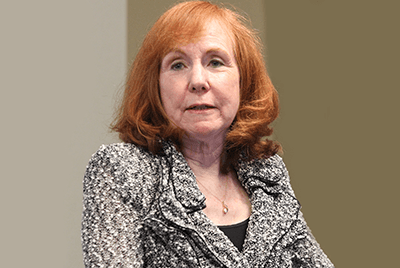
Antidepressants Celexa & Lexapro Ineffective for Childhood Depression
.2107091205550.png)
On January 24, 2018, Wisner Baum submitted a 53-page memorandum along with 79 supporting exhibits to the United States Attorney’s Office for the District of Massachusetts detailing how Forest Pharmaceuticals Inc. and Forest Laboratories Inc. (both acquired by Allergan in 2014) deliberately misled the DOJ during its investigation of the drug maker and 2010 settlement of the criminal and civil charges brought against the company.
Karen Wagner, M.D.
Lead “author” of Celexa Study MD-18

The government’s investigation of Forest focused on the company’s illegal off-label promotion of a supposedly positive Celexa study (MD-18 or “Wagner study”) and suppression of a negative Celexa study (94404 or the “Lundbeck study,” also known as the “European Study). Documents unearthed during the course of a series of civil lawsuits in Boston have revealed a much deeper deception than the government ever suspected. The government’s case was just the tip of the iceberg.
Forest Pled Guilty to Civil and Criminal Charges For Off-Label Promotion of Celexa and Lexapro For Use in Children and Adolescents
In 2010, Forest entered into a series of settlement agreements with the USAO for the District of Massachusetts. As part of the first agreement, Forest pleaded guilty to one count of obstruction and two counts of distributing a misbranded drug under the Food, Drug, and Cosmetic Act. The third count related to Forest’s promotion of Celexa for use in children and adolescents between 1998 and 2002. Forest paid more than $39 million in criminal fines for Celexa’s off-label promotion.
The second agreement resolved various qui tam False Claims Act lawsuits alleging pharmaceutical fraud through off-label promotion for both Celexa and Lexapro for children and adolescents between 1998 and 2005. Forest paid over $149 million to settle the civil claims.
Lastly, Forest entered into a five-year corporate integrity agreement to address its promotional misconduct.
Each agreement was contingent on the others and required complete honesty from Forest. However, according to unsealed Celexa and Lexapro court docs, the scope and extent of Forest’s fraud was not properly disclosed before the 2010 settlement agreements. Per the documents below, Forest misrepresented material facts underlying the USAO’s investigation.
How Did Forest Mislead the FDA and DOJ About Celexa and Lexapro?
First, A Primer on How Clinical Trials to Test the Efficacy of Medications Work
A drug’s efficacy is determined using double-blind randomized controlled trials (“DBRCTs”). A DBRCT involves the systematic comparison of patients taking a drug and patients taking a placebo. Patients enrolled in the clinical trials are randomly assigned into two groups. One group takes the drug and the other takes a placebo. However, neither the investigators nor the patient know which group each patient is in, i.e., they are “double blind.” Once the study is complete, the benefit observed in the two groups is compared, and if the patients taking the drug meaningfully outperform the patients in the placebo group, the clinical trial is considered positive. If the drug does not outperform placebo, it is called negative.
If either the investigator or the patient is unblinded during the clinical trial, it invalidates the data since there is no way to determine whether the effects observed are caused by the drug as opposed to other factors. Blinding is intended to limit the occurrence of conscious and unconscious bias in the conduct and interpretation of a clinical trial. If either the investigator or the patient knows they are receiving the drug, that knowledge will likely influence their assessment. Numerous studies have confirmed this fact. Blinding is a vital factor in medication research.
Forest Regulatory Affairs Manager: ‘Part of My Job is to Create “Masterful” Euphemisms to Protect Medical and Marketing’
A central feature of the government’s prosecution of Forest involved the promotion and dissemination of Forest’s “positive” Celexa Study MD-18 and the suppression of its negative Celexa Study 94404. What the government did not know is that MD-18 only achieved a positive result through the improper inclusion of nine patients in the study for whom “the blind was unmistakenly [sic] violated” or, as Forest’s medical director put it, who were “automatically unblinded” due to a dispensing error.
Upon learning about the dispensing error mishap, Forest informed the FDA that the unblinded patients would appropriately be excluded from the final analysis. But, when Forest realized the unblinded patients would need to be included to produce a positive result (i.e. show that Celexa was better than a placebo or sugar pill), Forest put the unblinded patients back into the MD-18 analysis and falsely told the FDA the patients were not actually unblinded.
In a draft letter to be sent to the FDA regarding the dispensing error, Amy Rubin, a Forest Regulatory Affairs Manager, characterized the error that caused the patients to become unblinded as only having “the potential to cause patient bias.” Dr. Charles Flicker, the Senior Medical Director overseeing MD-18, did not approve of this language:
“Altho ‘potential to cause bias’ is a masterful stroke of euphemism, I would be a little more up front about the fact that the integrity of the blind was unmistakenly [sic] violated.”
Rubin’s response to Dr. Flicker:
“Thanks for the compliement [sic]. Part of my job is to create ‘masterful’ euphemisms to protect Medical and Marketing.”
“Not only was the disclosure to the FDA dishonest, according to a Forest Regulatory Affairs manager, it was her job to mislead the FDA and protect medical and marketing,” says Wisner Baum attorney Brent Wisner.
Forest Labs Celexa and Lexapro Court Docs Unsealed
The Exhibits to the January 24, 2018 letter and Memorandum sent by Wisner Baum to the U.S. Attorney’s Office for the District of Massachusetts (which include court documents obtained in discovery and unsealed over Forest’s objection, as well as deposition testimony of Forest employees and former FDA staffers, etc.) are posted below.
Table of Contents
PART II: CELEXA PEDIATRIC CLINICAL TRIALS
- Celexa Study 94404 Was a Negative Clinical Trial Table 1 — Celexa Study 94404 Efficacy Results
- Celexa Study MD-18 Was a Negative Clinical Trial, but Forest Misled the FDA about the Results Table 2 – Celexa Study MD-18 Efficacy Results
- General Overview of MD-18 Study
- At the Beginning of the Trial, a Packaging Error Caused Nine Patients, and their Investigators, to Become Unblinded
- Celexa Study Dispensing Diagram
- Forest Knowingly Misled the FDA about the Nature of the Unblinding by Using, As Forest Regulatory Affairs Manager Put It, “Masterful Euphemisms” to “Protect Medical and Marketing”
- Despite Misrepresenting the Unblinding to the FDA, Forest Promised to Exclude the Data from the Patients from Its Primary Efficacy Analysis
- Forest Reneged on its Promise to Exclude the Unblinded Patients from the Primary Efficacy Results and, Again, Misrepresented the Unblinding in MD-18’s Final Study Report
- The FDA Never Fully Considered the Unblinding Issue and a Reasonable Regulator at the FDA Could Review this New Information and Conclude Study MD-18 Was Negative
- Forest Also Misled the FDA about the Results of the Secondary Endpoints Table 3 — Comparison of MD-18 Study Report & Dr. Heart Medical Review
PART III: FOREST USED FALSE RESULTS FROM MD-18 TO PROMOTE PEDIATRIC USE OF CELEXA AND LEXAPRO
PART IV: THE LEXAPRO PEDIATRIC TRIALS
- Lexapro Study MD-15 Was a Negative Clinical Trial Table 4 – Lexapro Study MD-15 Efficacy Results
- Lexapro Study MD-32 Was a “Positive” Clinical Trial for Adolescents, but Did Not Show a Meaningful Difference between Lexapro and Placebo
PART V: FOREST LEVERAGED THE FALSE RESULTS OF MD-18 TO OBTAIN AN ADOLESCENT INDICATION FOR LEXAPRO
Exhibits
- Exh. 1 Department of Justice Press Release Forest Celexa Lexapro Misled FDA Docs
- Exh. 2 Criminal Plea Agreement
- Exh. 3 Criminal Information
- Exh. 4 Civil Settlement Agreement
- Exh. 5 Forest Side Letter Agreement
- Exh. 6 Corporate Integrity Agreement
- Exh. 7 2016 Deposition Gerard Azzari (redacted)
- Exh. 7a Azzari Deposition Excerpts
- Exh. 8 2017 Deposition Thomas Laughren
- Exh. 8a Laughren Deposition Excerpts
- Exh. 9 CIT MD-18 Citalopram Pediatric Depression Study Report Excerpts
- Exh. 10 Celexa Product Manager Goetjen Email to Bill Heydorn
- Exh. 11 2016 Deposition William Heydorn
- Exh. 11a Heydorn Deposition Excerpts
- Exh. 12 2016 Deposition Steven Closter (redacted)
- Exh. 12a Closter Deposition Excerpts
- Exh. 13 Draft of Varner Letter with Flicker Hand Written Comments MDL FORP0168118
- Exh. 14 Memo Regarding Deviation Investigation MDL FORP0206957
- Exh. 15 Memo Regarding Deviation Report MDL FORP0206959
- Exh. 16 Email and Attached Fax Sent to Investigators Regarding Unblinding MDL FORP0168119
- Exh. 17 Email Preparing Varner Letter First with Attachment
- Exh. 18 Email Preparing Varner Letter
- Exh. 19 Varner Letter to Doctor Katz at FDA Regarding Unblinding
- Exh. 20 Email Regarding CIT MD-18 Citalopram Pediatric Depression Study
- Exh. 21 Email Regarding Notes from Conference October 4
- Exh. 22 Doctor Hearst (FDA) Medical Review
- Exh. 23 2001 Press Release Regarding Wagner American College Neuropsychopharmacology ACNP Meeting Presentation
- Exh. 25 Email Regarding American College Neuropsychopharmacology ACNP Meeting Pediatrics Abstract
- Exh. 26 Emails Regarding Wagner American Academy of Child and Adolescent Psychiatry ACCAP Meeting
- Exh. 27 Email Regarding Manuscript for American Academy of Child and Adolescent Psychiatry ACCAP Meeting
- Exh. 28 Selection of Off Label Call Notes
- Exh. 29 Lexapro Tactical Presentation (2002)
- Exh. 30 FDA Guidance for Industry E10 Choice of Control Group and Related Issues in Clinical Trials
- Exh. 31 FDA Guidance for Industry E9 Statistical Principles for Clinical Trials
- Exh. 32 Ghooi Assessment and Classification Protocol Deviations 2016
- Exh. 33 George Data Fraud in Clinical Trials
- Exh. 34 FDA Guidance for Industry Multiple Endpoints in Clinical Trials
- Exh. 35 94404 Integrated Clinical Study Report Citalopram Adolescent Depression Excerpts
- Exh. 36 Initial Disclosure of 94404 Integrated Clinical Study Report Citalopram Adolescent Depression Results
- Exh. 37 Email Regarding 94404 Integrated Clinical Study Report Citalopram Adolescent Depression Headline Results
- Exh. 38 Excerpts of 2007 Deposition William Heydorn
- Exh. 39 Email Regarding Publications for Pediatric Manuscript
- Exh. 40 New York Times Medicines Data Gap
- Exh. 41 Press Release Forest Discusses Disclosure of Citalopram Clinical Trial
- Exh. 42 94404 Integrated Clinical Study Report Citalopram Adolescent Depression Publication
- Exh. 43 CIT MD-18 Citalopram Pediatric Depression Study Protocol
- Exh. 44 Emails Regarding Urgent CIT MD-18 Citalopram Pediatric Depression Study
- Exh. 45 2016 Deposition Charles Flicker
- Exh. 45a Flicker Deposition Excerpts
- Exh. 46 Jureidini Expert Report
- Exh. 47 Glenmullen Expert Report
- Exh. 48 Email Regarding CIT MD-18 Citalopram Pediatric Depression Study Drug
- Exh. 49 Lexapro Approvable Letter for Adolescent Indication
- Exh. 50 Draft with Flicker Hand Written Comments to CIT MD-18 Citalopram Pediatric Depression Study
- Exh. 51 FDA Letter Denying Supplimental New Drug Application for Pediatric Major Depressive Disorder
- Exh. 52 Thomas Laughren (FDA) Memo Regarding Recommendation for Non-Approval
- Exh. 53 Excerpt of 2013 Deposition of Thomas Laughren
- Exh. 54 Email Regarding Pediatric Targets
- Exh. 55 Email Regarding American College of Physicians American Society of Internal Medicine ACP ASIM
- Exh. 56 Email Regarding Wagner Hot Topics Slides
- Exh. 57 Excerpts of 2015 Deposition of Natasha Mitchner
- Exh. 58 Wager Continuing Medical Education CME Slides
- Exh. 59 Emails Regarding Second Draft of Pediatric Manuscript
- Exh. 60 Emails Regarding Citalopram
- Exh. 61 Email Regarding American College Neuropsychopharmacology ACNP Pediatrics Abstract
- Exh. 62 Emails Regarding Update on American College Neuropsychopharmacology ACNP Press Releases
- Exh. 63 Wagner Citalopram for Major Depression in Children and Adolescents (Celexa)
- Exh. 64 Editors Note Regarding Wagner Publication
- Exh. 65 Transcript of Arraignment
- Exh. 66 2016 Azzari Deposition Excerpts
- Exh. 66a 2016 Deposition of Gerard Azzari
- Exh. 67 Excerpts of MD-15 Study Report Efficacy in Pediatric Depression
- Exh. 68 Letter from FDA Regarding Questions by Forest
- Exh. 69 Excerpts of MD-32 Study Report Escitalopram Pediatric Major Depressive Disorder
- Exh. 70 Defining a Clinically Meaningful Effect
- Exh. 71 Emslie Escitalopram in the Treatment of Adolescent Depression (Lexapro)
- Exh. 72 Email Regarding BLANK (with attachment)
- Exh. 73 Email Regarding DRAFT Lexapro Road Map
- Exh. 74 Medical Review by Roberta Glass FDA
- Exh. 75 Team Leader Review Lexapro for Adolescents FDA
- Exh. 76 Statistical Review and Evaluation Lexapro for Adolescents FDA
- Exh. 77 Laughren Memo Regarding Approval for Lexapro
- Exh. 78 Linkedin Profile for Doctor Thomas Laughren
- Exh. 79 Psychatric News June 17, 2016
- Letter and Memo to United States Attorney’s Office Massachusetts

OVER $4 billion
in verdicts & Settlements
Our top priority is to devise customized legal strategies that are tailored to the unique legal needs of our clients, no matter how simple or complicated their situations, might be.
-
$10 Million Settlement A Major Foreign Plane Crash
Wisner Baum obtained a $10 million settlement for the death of a passenger in a major foreign plane crash.
-
$14 Million Settlement A Major US Plane Crash
Wisner Baum obtained a $14 million settlement for the death of a passenger in a major US plane crash.
-
$17.5 Million Settlement A Major US Plane Crash
Wisner Baum obtained a $17.5 million settlement on behalf of a client who was killed in a major U.S. plane crash.
-
$10 Million Settlement Celexa-Lexapro Pediatric Class Action
$10 million pediatric class action re false promotion of Celexa and Lexapro. Babies born to women who have used Lexapro and other similar medications such as Zoloft, Celexa, Prozac, Paxil, and Symbyax are at an increased risk for birth defects.
-
$8.5 Million Verdict Commercial Truck Accident
Wisner Baum secured a $8.5 million wrongful death verdict against the food industry company, Tyson Foods, for the wrongful death of a young man.

Our Case Results

-
$265 Million Settlement Fatal Train Crash
In 2016, Wisner Baum attorney Timothy A. Loranger and six other attorneys in the Plaintiffs’ Management Committee were able to secure a $265 million settlement for victims of the 2015 Amtrak 188 derailment in Philadelphia, one of the largest in the U.S. for 2016.
-
$14 Million Settlement A Major US Plane Crash
Wisner Baum obtained a $14 million settlement for the death of a passenger in a major US plane crash.
-
$12 Million Settlement Helicopter Crash
Wisner Baum secured a $12 million settlement for a passenger who was injured in a helicopter crash.
-
$10 Million Settlement A Major Foreign Plane Crash
Wisner Baum obtained a $10 million settlement for the death of a passenger in a major foreign plane crash.
-
$2.0 Billion Verdict Personal Injury
In May of 2019, the jury in the case of Pilliod et al. v, Monsanto Company ordered the agrochemical giant to pay $2.055 billion in damages to the plaintiffs, Alva and Alberta Pilliod, a Bay Area couple in their 70s.
-
$80 Million Verdict Personal Injury
Wisner Baum attorneys served on the trial team in the case of Hardeman v. Monsanto Company, which resulted in an $80 million jury verdict for the plaintiff, Edwin Hardeman.

Client-Focused Representation
REVIEWS & TESTIMONIALS
We believe our track record speaks for itself. But you don’t have to take our word for it. See what our clients have to say about working with us.
-
"I Can’t Imagine a Better Law Firm"
Multiple lawyers recommended Wisner Baum to me and I have been consistently impressed with the quality of their work.
- Best Law Firms Survey -
"They Are About Changing the Systems..."
Wisner Baum are not only amazing attorneys but more importantly, they are activists. They are about changing the systems which got us into trouble in the first place. They understand their role in the process of making change.
- Kim Witczak -
"Top Legal Minds in the Country"
The Wisner Baum firm has some of the top legal minds in the country; they are driven, determined, trustworthy, ethical and passionate.
- From Best Lawyers® Best Law Firms





